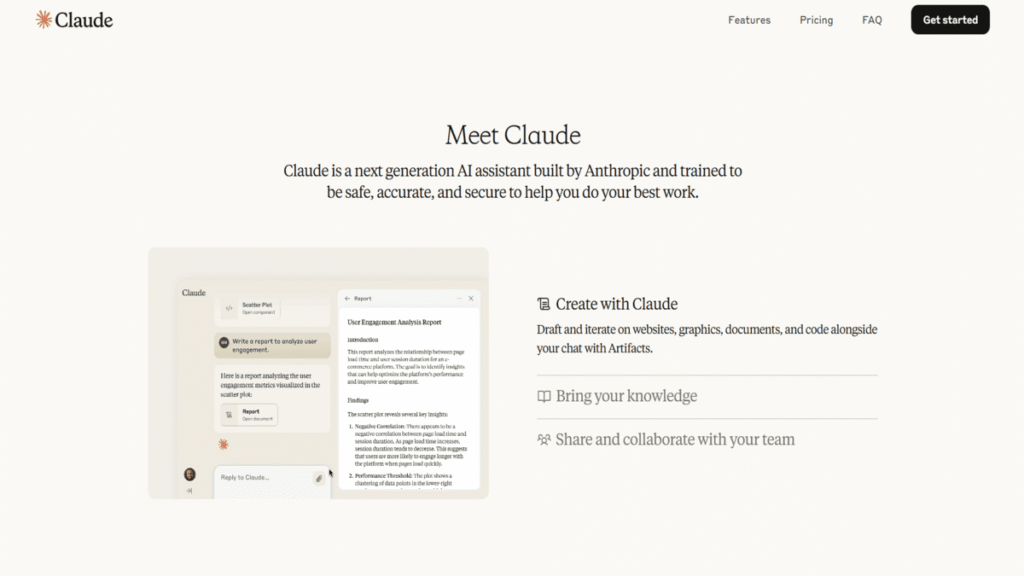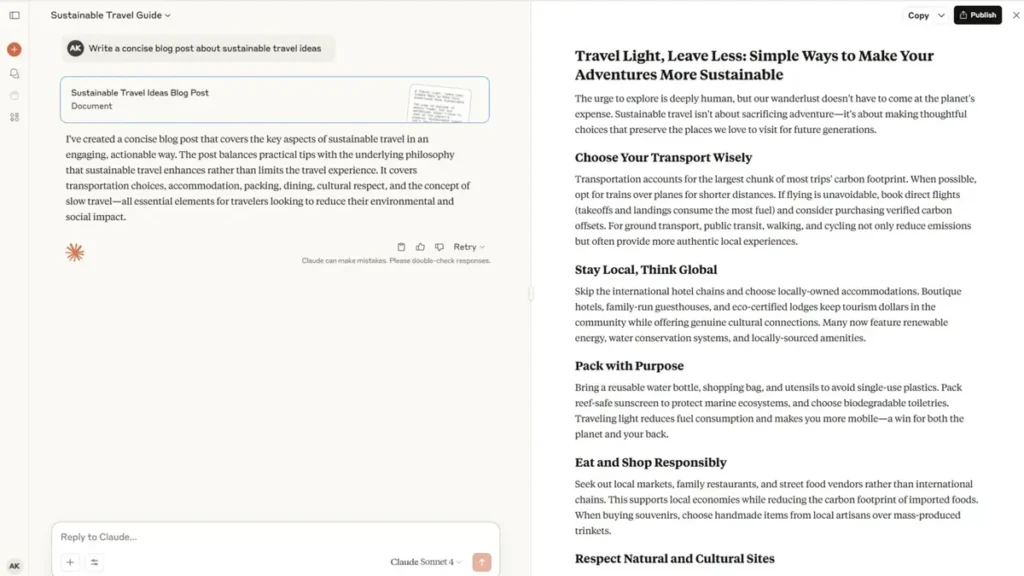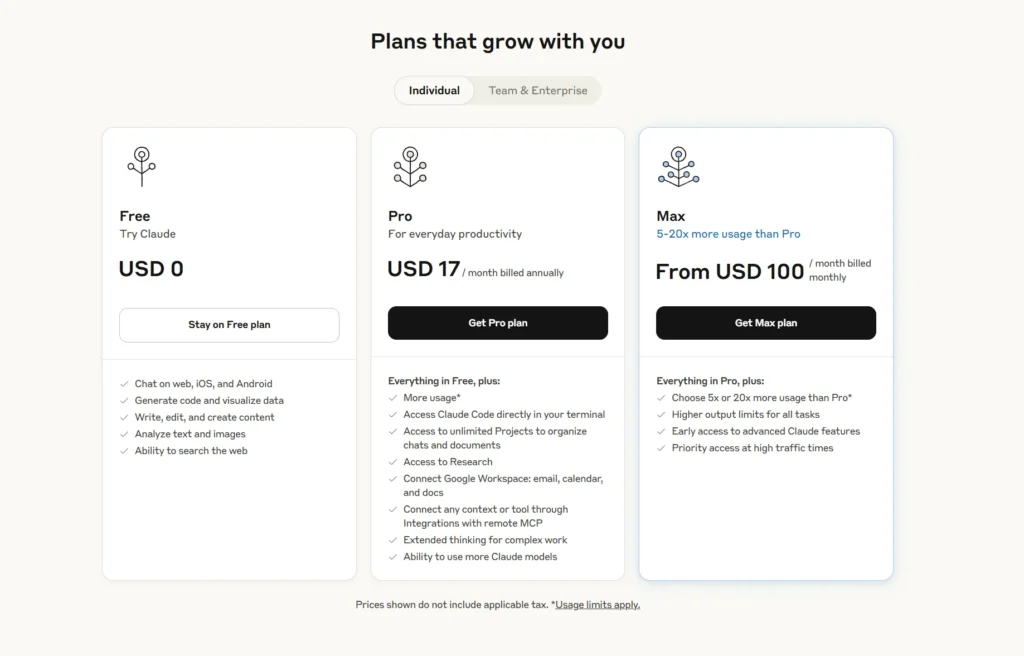Claude AI is a conversational AI tool from Anthropic, a company started by former OpenAI researchers. If you’re a writer, coder, or creator, you may have heard of it. In 2025, people are talking about Claude because it has a safe, ethical, and useful way of using AI.
With the launch of Claude 4 in May 2025, featuring advanced models like Opus 4 and Sonnet 4, Claude has added powerful features like real-time web search and custom response styles. This review dives into why Claude is a go-to tool for writers drafting novels, coders debugging complex projects, and marketers crafting campaigns.
Whether you’re weighing Claude against ChatGPT or Gemini or just curious about its capabilities, this post offers real-world insights to help you decide if Claude fits your needs.
Table of Contents
AI tools are now must-haves for professionals, and Claude’s rise comes from its ethical design, massive 200k-token context window, and privacy-first approach. This Claude AI review is for writers needing reliable long-form content support, coders wanting clear code explanations, and creators looking for strategic ideas. Let’s explore what makes Claude AI shine in 2025.
What Is Claude AI?
Claude AI, powered by Anthropic’s Claude 4 family (Haiku 4, Sonnet 4, and Opus 4), is a conversational AI built for clarity, safety, and versatility. Claude 4, which came out in May 2025, builds on the success of Claude 3 by offering better coding, reasoning, and content creation.
Anthropic’s Constitutional AI makes sure that responses are moral and in line with human values, which reduces the chances of biased or harmful outputs. Claude puts more emphasis on giving reliable, context-aware answers than ChatGPT, which can be too creative, or Gemini, which focuses on real-time data.
The Claude 4 models serve different purposes:
- Haiku 4: Fast and lightweight, great for quick tasks like drafting emails or answering simple questions.
- Sonnet 4: Balances performance and efficiency, ideal for writing, coding, and general tasks.
- Opus 4: The most advanced, designed for complex challenges like analyzing long documents or coding intricate algorithms.

Professionals and casual users can use Claude in many ways thanks to its new features, such as real-time web search and custom response styles. It can handle both text and images, which makes it useful for a wide range of tasks. Find out more about Claude 4.
Claude AI for Writers
A writer’s best friend is Claude. It makes blog posts, articles, and book chapters that sound like real people wrote them. Want to change the style of a draft? Claude can easily switch between formal, casual, and persuasive tones. It’s also great for making engaging stories or summarizing long documents. Compared to ChatGPT, Claude’s outputs are less likely to include fluff and more focused on factual accuracy, thanks to its ethical guardrails.
Real-Life Example: I asked Claude to write a 300-word blog post on eco-friendly travel tips for 2025. The prompt was: “Write a concise blog post about sustainable travel ideas.” Claude wrote a clear, interesting post with helpful advice, like renting electric cars and staying in eco-friendly hotels. Unlike ChatGPT, which sometimes adds unverified statistics, Claude’s draft was short and ready to be published with only a few changes.

Verdict: Claude is perfect for writers needing reliable, professional drafts. Claude’s 200k-token context window is a massive help for writers and researchers. It can handle whole manuscripts, making sure that chapters are consistent or suggesting plot twists for fiction writers. Claude organizes research notes, suggests outlines, or makes arguments stronger for non-fiction. Because it keeps track of context, it’s great for complicated writing tasks.
Claude AI for Coders
Coders will love Claude’s coding capabilities, especially with Claude 4 Opus 4 and Sonnet 4 models, which excel in benchmarks like HumanEval. Claude supports languages such as Python, JavaScript, and Java, as well as frameworks like React and Django.
It generates code, debugs errors, and explains complex logic in plain English. Claude’s suggestions are more straightforward and context-aware than ChatGPT’s, but they may take longer to get to the point. Claude gives more detailed explanations than GitHub Copilot, but it doesn’t work as well with IDEs.
Example: I gave Claude a buggy Python script with a TypeError. It identified the issue (a string-integer mismatch), provided a solution, and explained why it occurred. ChatGPT provided a similar solution but with less context, while Copilot was faster but less informative. Claude’s massive context window makes it great for large projects, though it may struggle with niche libraries.

Claude 4’s analysis tool enables coders to execute code and gain real-time insights, making it valuable for machine learning, web development, or data preprocessing. It also suggests optimizations for performance or accessibility, improving code quality. Explore Claude’s coding features.
Claude AI for Creators
Claude is a creative powerhouse for designers, marketers, and strategists. It is excellent at coming up with campaign ideas, writing social media posts, or scripting videos. Want a month’s worth of Instagram captions? Claude makes them fit your brand’s voice, whether it’s serious or fun.
Its ad copy and email campaigns are concise and persuasive, avoiding ChatGPT’s sometimes overly creative style. The new analysis tool for real-time data insights helps marketers make data-driven decisions.
Example: I asked Claude to create a Twitter thread for a tech startup’s product launch. It delivered a punchy, on-brand thread that felt authentic. ChatGPT’s version was fun, but it was too flashy. Verdict: Claude’s strategic, voice-aligned content makes it a marketer’s secret weapon.

Claude also helps with product descriptions, workflow design, or content calendars. Its ability to handle long-form content and maintain context makes it versatile for creative professionals.
What makes Claude AI stand out
There are a lot of great things about Claude:
- Long Context Window: It can handle documents or conversations that are up to 200,000 tokens long.
- Privacy and Safety: Constitutional AI makes sure that responses are safe and ethical, and it has a strict opt-in data policy.
- Uploading Files: You can upload PDFs, documents, or pictures for processing and analysis.
- Real-Time Web Search: Search the web in real time to get the most up-to-date information for correct answers.
- Custom Response Styles: Change the tone or style of your responses to get personalized results.
- Analysis Tool: Run code and get real-time information for coding and data analysis tasks.
These features make Claude a powerful tool for professionals needing precision and reliability—Discover Claude’s features.
Pricing & Availability
Claude offers flexible pricing plans:
- Free Plan: $0, but you can only use it a few times (about 20 searches a day).
- Pro Plan: $20/month ($17/month if billed annually), includes more usage, advanced models, and features like Claude Code.
- Max Plan: From $100 per person, offers 5x or 20x more usage, higher output limits, and early access to advanced features.
- Team Plan: $30/user/month (billed monthly) or $25/user/month (billed annually, min 5 members), includes collaboration features.
- Enterprise Plan: Custom pricing, with enhanced security and larger context windows.
- Education Plan: Discounted rates for students and faculty, with comprehensive access and API credits.

Claude is available globally via Claude.ai, iOS, Android, and desktop apps. Some regions may face API restrictions. Check pricing details..
| Plan | Price (Monthly) | Key Features |
|---|---|---|
| Free | $0 | Basic chat, code generation, text/image analysis, web search |
| Pro | $20 ($17 annually) | More usage, Claude Code, unlimited Projects, Google Workspace integration |
| Max | From $100 | 5x-20x more usage, early access to advanced features |
| Team | $30 ($25 annually, min 5 users) | Collaboration features, central billing |
| Enterprise | Custom | Enhanced security, larger context window, SSO, audit logs |
Claude AI Pros & Cons
| Pros | Cons |
|---|---|
| Constitutional AI gives safe, correct answers. | Not a lot of help for niche coding libraries. |
| Long-form content has a 200k-token context window. | Fewer integrations than ChatGPT’s ecosystem. |
| A tone of voice that is both natural and professional. | Lacks Gemini’s real-time data access, though web search helps. |
| Opus 4 is the best coding model in the world, and it lets you do top-tier coding. | |
| Policies for data collection that are privacy-focused and opt-in. |
Claude AI vs ChatGPT: Which Should You Use in 2025?
Claude and ChatGPT are both strong, but they are good at different things:
| Claude AI | ChatGPT |
|---|---|
| Best for tasks that require accuracy, ethics, and a long context. Perfect for writers who need to get the facts right, coders who are working on hard projects, and creators who want to make strategic content. | It is very flexible, creative, and has more advanced features like memory retention. Good for creative writing, multimedia projects, and people who need to connect things deeply. |

Use Case Breakdown:
- Writers: Use Claude for writing that is structured and full of facts, and ChatGPT for writing that is creative and conversational.
- Coders: Claude for clear explanations and complex code; ChatGPT for quick snippets and IDE integration via Copilot.
- Marketers: Claude for strategic, brand-aligned content; ChatGPT for dynamic, creative ideas.
Compare Claude and ChatGPT.
Conclusion
Professionals who value accuracy, safety, and long-term capabilities should consider Claude AI in 2025. Its advanced models, ability to search the web in real time, and focus on privacy make it perfect for writers, programmers, and creators. Claude’s ability to be accurate and understand context is impressive, even if it isn’t as new or well-integrated as ChatGPT.
I was very impressed with Claude. It felt like a thoughtful partner who could easily fix bugs and improve drafts. Claude is a good AI tool to try if you need one that is trustworthy and ethical. Writers and coders who have to do hard work will love it, but creative people might like ChatGPT’s style better.
FAQs About Claude AI
Is Claude AI better than ChatGPT for writers?
Claude is better for writing that is structured and full of facts because it is clear and has ethical guidelines. ChatGPT is great at creative and conversational tasks.
Can Claude AI write code?
Yes, Claude generates and debugs code in languages like Python and JavaScript, with clear explanations, though it’s less integrated than GitHub Copilot.
How accurate is Claude AI in 2025?
Claude’s Constitutional AI minimizes errors, making it highly accurate for factual content, though it lacks Gemini’s real-time data access.
Where can I use Claude AI for free?
Claude’s free tier is available on Claude.ai or platforms like Poe, with daily message limits
Does Claude AI save your data?
Claude has a strict opt-in data policy, ensuring inputs aren’t used for training unless explicitly allowed, prioritizing user privacy.
Also Read This : How to Make Money Using AI in 2025: 25 Best ideas


